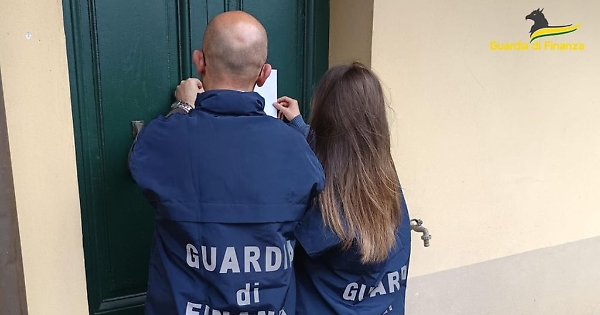Lucca Building Bonus Fraud: €750,000 Seized – A Deep Dive into the Scandal
Editor’s Note: A major investigation into building bonus fraud in Lucca has resulted in the seizure of €750,000. This article delves into the details of the scandal and its implications.
Why This Matters: Unmasking the Corruption in Italy's Building Bonus Scheme
Italy's building bonus scheme, designed to incentivize renovations and improve energy efficiency, has been plagued by fraud. The recent seizure of €750,000 in Lucca highlights a critical problem: the vulnerability of such large-scale government programs to exploitation. This case underscores the need for stricter oversight and more robust anti-fraud measures to protect taxpayer money and ensure the integrity of the national building sector. Understanding this scandal is crucial for anyone concerned about government transparency, economic stability, and the future of Italian infrastructure. This article will explore the key aspects of the Lucca case and its broader implications for Italy's building industry.
Key Takeaways
| Point | Detail |
|---|---|
| Amount Seized | €750,000 |
| Location | Lucca, Italy |
| Type of Fraud | Building Bonus Scheme Exploitation |
| Impact | Undermines public trust, wastes taxpayer funds, impacts future funding |
| Investigation Status | Ongoing; further arrests and seizures are anticipated |
Lucca Building Bonus Fraud: A Detailed Analysis
The recent €750,000 seizure in Lucca represents a significant development in an ongoing investigation into widespread fraud related to Italy's building bonus scheme. This scheme, intended to boost the economy and improve energy efficiency, offers substantial tax credits for home renovations. However, it has become a target for organized crime and unscrupulous individuals.
Key Aspects:
- False Invoices: The investigation revealed a network generating false invoices to inflate the amount of work supposedly carried out, thereby claiming higher tax credits.
- Shell Companies: Several shell companies were used to launder the illicit funds obtained through fraudulent claims.
- Collusion: Evidence suggests collusion between contractors, homeowners, and possibly officials to defraud the system.
Interactive Elements: Understanding the Mechanics of the Fraud
False Invoicing: A Case Study
The creation of false invoices is at the heart of the Lucca scandal. Contractors, in collusion with homeowners, inflated the cost of renovations on official documents. This allowed them to claim significantly higher tax credits than they were actually entitled to. The risk involved for homeowners is substantial, including potential prosecution for fraud and the loss of any tax benefits they were hoping to receive. Mitigations against this type of fraud include stricter verification processes and improved auditing procedures.
Shell Companies and Money Laundering
The illicit funds obtained through false invoices were subsequently channeled through a network of shell companies. These companies, often with minimal real activity, served to obscure the origin of the money and make it difficult for authorities to trace the funds. The impact of such money laundering schemes extends beyond the immediate fraud, undermining the stability of the financial system and creating opportunities for further criminal activity.
People Also Ask (NLP-Friendly Answers)
Q1: What is the Lucca Building Bonus Fraud?
A: The Lucca Building Bonus Fraud refers to a major investigation into the fraudulent exploitation of Italy's building bonus scheme, resulting in the seizure of €750,000.
Q2: Why is this fraud important?
A: This fraud is significant because it highlights the vulnerability of large government programs to exploitation, wastes taxpayer money, and undermines public trust in the system.
Q3: How can this fraud affect me?
A: As a taxpayer, you are directly affected as your money is misused. As a homeowner considering renovations, you risk prosecution if involved in fraudulent activities.
Q4: What are the main challenges in tackling this type of fraud?
A: Challenges include identifying fraudulent claims amongst legitimate ones, tracing laundered funds, and prosecuting those involved in complex schemes.
Q5: How to avoid being involved in building bonus fraud?
A: Only use certified contractors, meticulously check invoices, and report any suspicious activity to the authorities.
Practical Tips for Avoiding Building Bonus Fraud
Introduction: These tips can help homeowners and contractors avoid becoming involved in fraudulent schemes.
Tips:
- Verify Contractor Credentials: Ensure your contractor is properly licensed and registered.
- Detailed Contracts: Sign detailed contracts specifying all work and costs.
- Scrutinize Invoices: Carefully review all invoices for discrepancies.
- Keep Accurate Records: Maintain comprehensive records of all transactions and communications.
- Consult with Tax Professionals: Seek professional advice on claiming tax credits.
- Report Suspicious Activity: Report any suspected fraud to the authorities immediately.
- Use Secure Payment Methods: Avoid cash transactions; opt for traceable payment methods.
- Transparency is Key: Maintain open communication with your contractor throughout the process.
Summary: By following these tips, you can minimize your risk of becoming involved in building bonus fraud.
Transition: The Lucca scandal underscores the importance of diligence and transparency in all building projects.
Summary (Riepilogo)
The seizure of €750,000 in Lucca represents a significant blow to those involved in exploiting Italy's building bonus scheme. The investigation highlights the need for stricter regulations, enhanced oversight, and increased public awareness to combat this type of fraud effectively.
Closing Message (Messaggio Conclusivo)
The Lucca case serves as a stark reminder of the consequences of unchecked corruption. It is crucial that both citizens and authorities remain vigilant to protect the integrity of public funds and ensure the future success of crucial national initiatives.
Call to Action (Chiamata all'azione)
Share this article to raise awareness about building bonus fraud. Stay informed about updates by subscribing to our newsletter for further investigations and analyses of Italian economic affairs.

